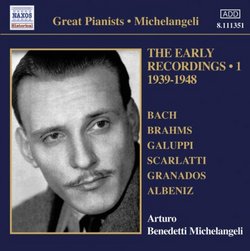| All Artists: Early Recordings Title: Early Recordings Vol. 1 Members Wishing: 0 Total Copies: 0 Release Date: 11/18/2008 Genre: Classical Style: Number of Discs: 1 SwapaCD Credits: 1 UPC: 747313335121 |
Search - Early Recordings :: Early Recordings Vol. 1
CD DetailsSimilar CDs
|
CD ReviewsTHE ARTIST AS A YOUNG MAN DAVID BRYSON | Glossop Derbyshire England | 08/03/2010 (5 out of 5 stars) "Michelangeli was notoriously reclusive, so perhaps the product page for this disc is entering into the spirit of it all by telling us nothing about what the disc contains. In fact, I have had to apply some genuine ingenuity to the search-engine in order even to locate the product here at all. At the risk of dispelling any mystique, I suppose my first duty as a reviewer is to rectify this deficiency. There are ten separate items, as follows
. Bach's Italian Concerto . Busoni's arrangement of the Chaconne from Bach's D minor violin partita . An Allegro by Tomeoni . A Presto by Galuppi . 4 Scarlatti sonatas . Brahms's Paganini Variations . The famous Andaluza of Granados . Marescotti's Fantasque (a specially composed test piece for competition entrants) . Albeniz's Malaguena . Mompou's Cancion y danza #1 The Chaconne, the Brahms and the Galuppi were recorded in London over a 2-day period in 1948: the remaining items are from Milan between 1939 and 1943. Michelangeli-collectors who have been accustomed down the years to picking up any bits and pieces that they could find will surely welcome this handy collection, all but 80 minutes' playing time and surprisingly well recorded. Before I get going with my raptures over Michelangeli, let me at this point insert one of my usual (and totally unsolicited) tributes to Naxos for their enterprise and imagination. He was, in my opinion, a totally unique phenomenon, quite possibly the finest player of the piano there has ever been. In 1939, when he got his first major break through winning a competition in Geneva, he was all of 19 years old, but it was all there already. You will hear that wonderful singing tone in several of the pieces. You will hear his effortless-seeming virtuosity at numerous other points, but it has something about it that other great virtuosi do not have - his morose alternations of mood, abrupt and intimidating at times, but always subject to that regal poise and control. There is never the remotest suggestion of ugliness in M's tone, even when he piles up enormous crescendos in the Chaconne, but what is there to overawe you is an unbelievably perfect graduation in each buildup and a huge organ-like volume at every climax. And there is heart and soul too. Did the Paganini Variations ever sound like this from any other interpreter? In case you did not know, M used to play his own edited version of the Paganinis, making one work out of Brahms's two. He gives the theme only once, forte as at its first occurrence, and he rearranges and combines the two sets of variations, leaving out a small number. If that upsets you, tough. This is Michelangeli, and there is nobody like him. In fact while I will plead guilty with pleasure to being a Michelangeli addict I don't think it takes that to find nothing objectionable in this procedure. It makes a single work of proper length and stature out of two books of pieces that can easily sound too short when played separately and too long when played successively. What I am not so sure about is whether there is any authority for some tarting-up of the glissandos in the last variation before the finale, but as usual I am not about to take any exception. Just listen to how they are played. On the other hand, M seems to be exceptionally 'authentic' in another respect. The tempo indicated for the middle movement of the Italian concerto is 'andante', and M plays it andante. My other versions are from Serkin, Gould and Malcolm, great and devoted Bachians all, and I had become reconciled to thinking that 'andante' must really mean 'adagio' because that is how all three play it. It sounds fine to me as an andante, I must say. Naxos being Naxos, they have even managed to provide a short liner-note that is informative and literate, and all at a bargain rate as usual. I am very pleased to have been given this disc, and to have the opportunity to bring it to the notice of any other music-lovers for whom great playing and great musicianship are things that matter. " |


